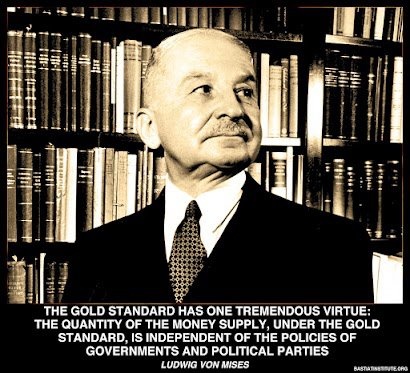I wrote yesterday about the two big reasons that central banks – such as the Federal Reserve in Washington – impose misguided monetary policy.
- They create too much money because they want to artificially goose the economy with Keynesian monetary policy, especially during election season.
- They create too much money because they want to finance more government spending based on the nutty idea of modern monetary theory (an approach that has failed in places like Turkey, Argentina, or Sri Lanka).
In Part II, let’s consider whether there are ways to block or discourage irresponsible monetary policy.
For hard-core libertarians, the answer is easy. Just abolish the Fed and rely on the private sector to produce competing currencies.
That approach actually used to exist in some nations in the 1800s and earlier, and it has a good track record.
But don’t hold your breath expecting that kind of radical reform. Politicians are not going to surrender their power over a key variable in the economy.
Another option is a gold standard.
That approach to exist before World War I and also has a good track record.
But it’s also not terrible realistic, especially since there are good reasons to think governments today wouldn’t implement and maintain it in a sensible manner.
So most proponents of good policy today focus on more targeted reforms, most of which are designed to discourage central bankers from imposing inflationary policy.
But not everyone favors anti-inflation policies. In an editorial about various GOP economic proposals, the Washington Post criticizes any limits on the powers of the Federal Reserve.
Even worse is the rising urge to attack the Federal Reserve. While in office, Mr. Trump mused publicly about firing Fed Chair Jerome H. Powell. Entrepreneur Vivek Ramaswamy wants to restrict the Fed’s mandate to “stabilize the dollar & nothing more.” Mr. Pence wants to end the Fed’s dual mandate — minimizing inflation and maximizing employment — in favor of an inflation-fighting-only mission. Mr. DeSantis vows to “rein in” the Fed and stop its development of a digital currency. Since the early 20th century, Fed independence has undergirded U.S. prosperity; meddling with the central bank would cause immediate and immense economic harm.
The editorial is wrong. If you want to know whether the Fed has “undergirded U.S. prosperity,” just watch this video and you’ll quickly learn the Fed has been a destabilizing force, producing boom-bust cycles (and the busts are always worse than the booms).
Regarding some of the specific ideas cited in the editorial, Pence and Ramaswamy are right to say that the Fed should focus solely on price stability, which is just another way of saying we should not have Keynesian monetary policy.
And kudos to DeSantis for opposing a central bank digital currency. Governments would have vast new powers to abuse if cash was eliminated.
P.S. If you want some Fed humor, we have a Who-is-Ben-Bernanke t-shirt, this Fed song parody, some special Federal Reserve toilet paper, Ben Bernanke’s hacked Facebook page, and the famous “Ben Bernank” video.
———
Image credit: Rdsmith4 | CC BY-SA 2.5.



